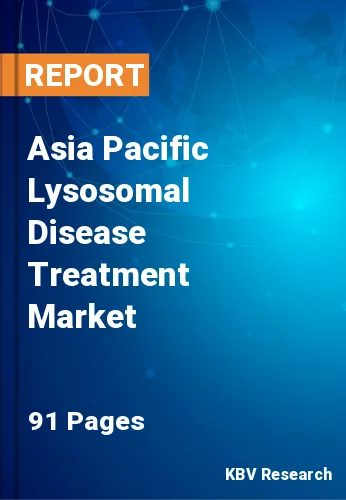The Asia Pacific Lysosomal Disease Treatment Market would witness market growth of 7.3% CAGR during the forecast period (2022-2028).
The inactivated, late-onset form of Gaucher disease (type 1 disease) is characterized by hepatosplenomegaly and skeletal involvement. However, the macrophages of the reticuloendothelial system must break down vast quantities of glycosphingolipid because of their function in the phagocytosis of effete blood cells. Specific people fall between these two phenotypes and have skeletal and systemic disease as well as brainstem involvement (traditionally known as type 3 disease), which raises the possibility that some neuronal subtypes are especially sensitive to glucocerebrosidase deficiency.
The genotype-phenotype correlation at least partially supports this theory, because some "severe" genotypes are invariably linked to neuronopathic illness in homozygotes or complex heterozygotes. However, the majority of mutations that result in attenuated disease have much less clearly defined genotype/phenotype relationships, and sibling pairs and even twins frequently exhibit clinical features that are very different from one another in terms of age of onset and degree of skeletal involvement. The problems in predicting phenotypic from genotype have significant consequences in disorders for which newborn screening is currently being studied.
A National Policy for the Treatment of Rare Diseases (NPTRD) was created by the Ministry of Health and Family Welfare of the Government of India in July 2017. The policy's implementation, however, ran into several issues. Hospitals and public health are primarily state concerns. At the draught stage of policy formulation, extensive stakeholder participation with the State Governments was not possible.
During the sharing of the policy with State Governments, some expressed concerns, including the cost-effectiveness of initiatives for rare diseases compared to other health priorities, the allocation of expenditures between the Central and State Governments, and the flexibility of the State Governments to accept or modify the policy. The growing awareness of lysosomal drives the growth of the lysosomal disease treatment market.
The China market dominated the Asia Pacific Lysosomal Disease Treatment Market by Country in 2021, thereby, achieving a market value of $831.6 Million by 2028. The Japan market is experiencing a CAGR of 6.7% during (2022 - 2028). Additionally, The India market would showcase a CAGR of 8% during (2022 - 2028).
Based on Disease Type, the market is segmented into Gaucher's Diseases, Fabry Diseases, Mucopolysaccharidosis, Pompe’s Syndrome and Others. Based on Type of Therapy, the market is segmented into Enzyme Replacement Therapy, Substrate Reduction Therapy, Stem Cell Therapy and Others. Based on End User, the market is segmented into Hospitals, Clinics and Others. Based on countries, the market is segmented into China, Japan, India, South Korea, Singapore, Malaysia, and Rest of Asia Pacific.
Free Valuable Insights: The Worldwide Lysosomal Disease Treatment Market is Projected to reach USD 11 Billion by 2028, at a CAGR of 6.3%
The market research report covers the analysis of key stake holders of the market. Key companies profiled in the report include Merck & Co., Inc., Johnson & Johnson (Janssen Global Services, LLC), Eli Lilly And Company, Pfizer, Inc., Takeda Pharmaceutical Company Limited, Sanofi S.A., Novartis AG, AstraZeneca PLC (Alexion Pharmaceuticals, Inc.), BioMarin Pharmaceutical Inc. and Sigilon Therapeutics, Inc.
By Disease Type
By Type of Therapy
By End User
By Country
Our team of dedicated experts can provide you with attractive expansion opportunities for your business.

